
Determining the molecular characteristics of one’s disease may influence the therapy employed in the first line as well as subsequent settings.

Your AI-Trained Oncology Knowledge Connection!


Determining the molecular characteristics of one’s disease may influence the therapy employed in the first line as well as subsequent settings.
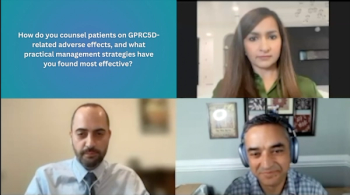
Unique toxicities presented with talquetamab tend to get progressively better as the treatment course continues, according to Prerna Mewawalla, MD.
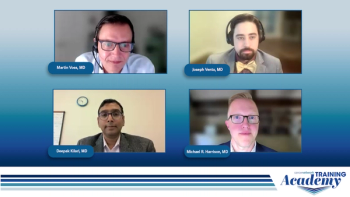
Panelists discuss the rapidly evolving landscape of non–clear cell renal cell carcinoma, emphasizing the shift toward subtype-specific clinical trials, the critical role of next-generation sequencing and germline testing in guiding personalized treatment, and the importance of ongoing research collaborations to advance precision medicine and improve patient outcomes.

Panelists discuss the complexities of managing metastatic chromophobe renal cell carcinoma in a high-risk patient, emphasizing the role of molecular testing, limited but evolving therapeutic options including VEGF and mTOR inhibitors and immunotherapy, and the urgent need for subtype-specific clinical trials to guide personalized care.

Panelists discuss the case of a metastatic papillary kidney cancer patient, emphasizing the importance of balancing efficacy and tolerability in frontline therapy selection, incorporating molecular profiling, and considering immune-based combinations alongside targeted agents within a personalized, multidisciplinary care framework.
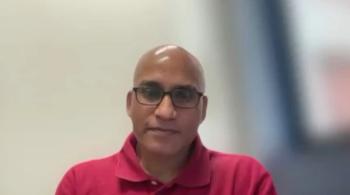
Modification of REMS programs may help patients travel back to community practices sooner, according to Suman Kambhampati, MD.
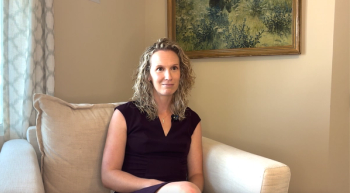
Kelly Dyckman, MSW, LCSW, offers advice for caregivers of patients with cancer, emphasizing the need for proactive self-care and recognizing burnout.

Dr. Husain discusses how anticipating resistance mechanisms and tailoring post-progression strategies based on initial therapy are key to optimizing sequencing in EGFR-mutant NSCLC.

Dr. Husain discusses how selecting between FLAURA-2, MARIPOSA, and other frontline regimens requires balancing efficacy, safety, and sequencing considerations to deliver the most personalized care in EGFR-mutant NSCLC.

Dr. Husain discusses how updated MARIPOSA and FLAURA-2 data highlight the growing role of combination regimens in improving both systemic and CNS outcomes for patients with EGFR-mutant NSCLC.

Symposiums and regional meetings may expand knowledge of how to adopt novel CAR T-cell therapies and bispecific antibodies, said Suman Kambhampati, MD.
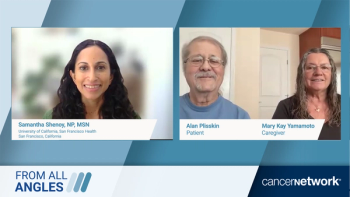
Panelists discuss how health care providers and patients should understand that talquetamab's unique adverse effects are temporary and resolve over time, even while continuing treatment, emphasizing the drug's excellent efficacy and the importance of removing stigma around its manageable toxicity profile.

Panelists discuss how effective caregivers should join support groups, maintain detailed records of symptoms and medications, attend all appointments, stay informed about myeloma research, and serve as active advocates who can communicate with health care teams when patients cannot.

Panelists discuss how patients beginning talquetamab treatment should maintain a positive attitude, prepare thoroughly with educational materials, and understand that although initial adverse effects can be challenging, they are temporary and manageable with proper preparation and support.

Panelists discuss how patients can maintain their nutrition during talquetamab treatment by focusing on texture and food presentation when taste is impaired, using high-calorie options, and remembering that taste changes and dry mouth are temporary adverse effects that improve over time.

Panelists discuss how specific talquetamab-related adverse effects such as skin peeling, nail changes, and rashes can be effectively managed through targeted interventions, including topical treatments, protective measures, and preventive strategies tailored to the drug's unique toxicity profile.

Panelists discuss how health care providers can develop comprehensive management protocols for talquetamab-related toxicities by consulting with specialists, gathering patient feedback, and creating detailed handouts that empower patients to proactively manage adverse effects before they begin treatment.
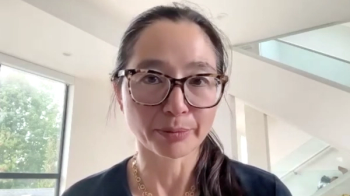
Brachytherapy plaque with vitrectomy and silicone oil was most often given to patients with uveal melanoma tumors sized 2 mm or larger.

Physical therapists may play a key role in patient care before, during, and after treatment for cancer, according to Alison Ankiewicz, DPT, PT.
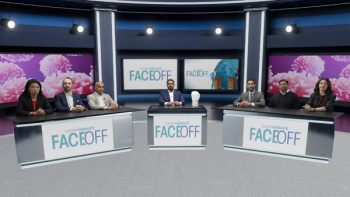
Experts discuss the treatment dilemma for a 72-year-old man with high-risk, metastatic EGFR-mutant lung cancer, weighing the benefits of aggressive combination therapy against monotherapy while emphasizing patient preferences, comorbidities, and quality-of-life considerations in individualized care.

Experts discuss a complex case of a middle-aged woman with high-risk EGFR-mutant lung cancer and brain metastases, highlighting the balance between aggressive combination therapies and patient-centered shared decision-making amid clinical, logistical, and psychosocial challenges.

Experts discuss the complexities and controversies in sequencing therapies beyond first-line treatment for EGFR-mutant lung cancer, balancing up-front regimen efficacy with preserving later treatment options while navigating evolving evidence, emerging therapies, and real-world challenges such as access and individualized patient care.
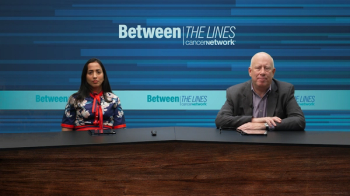
Panelists discuss how the field is shifting from reactive to proactive management of dermatologic adverse events, with future developments potentially including new topical treatments and integrated dermatology support within oncology practices.

Kelly Dyckman, MSW, LCSW, discusses the need for proactive, not reactive, communication about posttreatment challenges to better support cancer survivors.
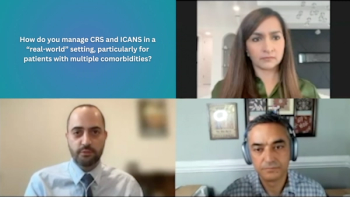
Prophylactic steroid or tocilizumab use may help in preventing CRS in patients undergoing treatment with bispecific antibodies for multiple myeloma.

Recommending counseling sessions may help patients with cancer navigate sexual health and emotional issues during their cancer treatment.

Panelists discuss how comprehensive patient education materials and manufacturer resources help patients prepare for and manage talquetamab adverse effects, with prior experience from chimeric antigen receptor (CAR) T-cell therapy providing valuable context for understanding potential complications such as cytokine release syndrome (CRS).

Panelists discuss how real-world data consistently show bispecific efficacy matching clinical trial results despite treating higher-risk patients, and how prophylactic interventions have reduced cytokine release syndrome severity.

Panelists discuss how CAR T-cell therapy should generally precede bispecifics when possible due to T-cell exhaustion concerns, though they agree there are virtually no absolute contraindications to bispecific therapy.

Tara A. McCannel, MD, PhD, discusses how brachytherapy plaque with vitrectomy and silicone oil led to a 100% survival rate in patients with uveal melanoma.